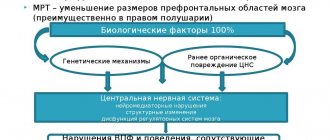Distracted attention is a fairly serious disorder of the nervous system that can affect any person. Sometimes absent-mindedness goes away on its own, and sometimes, on the contrary, it provokes even bigger problems.
Attention deficits and accompanying symptoms can cause severe discomfort and interfere with normal functioning. So what is absent-mindedness and inattention from a medical point of view, how does this condition manifest itself and how to deal with it?
What is attention from a psychological point of view?
Attention is a concept in cognitive psychology that represents the extent to which we process specific information that our brain receives from the environment.
Thanks to attentiveness, the subject’s successful orientation in the surrounding space is ensured, and it also ensures a complete and clear reflection in the psyche. The object of attention falls into the center of our consciousness, other elements are perceived weakly, not clearly, but at the same time the direction of our attention can change.
There are several types of attention:
- Involuntary type . While working with this type of attention, a person does not make any effort of will to concentrate, he does not even set a goal for himself.
- Arbitrary type . During this type, a person makes an effort of will to focus on a specific object.
- Postarbitrary type . During this type of attention, a decrease in volitional efforts is characteristic, but the goal of being attentive remains.
Treatment
An absent-minded person may not need drug therapy. Sometimes following certain recommendations is enough to improve the process of concentration. However, for certain conditions, medications may also be prescribed, including:
- Piracetam - to improve brain activity;
- Glycine - has a beneficial effect on the nervous system and increases performance;
- Biotredin - improves cognitive functions, improves memory, increases alertness;
- Phenibut - affects the improvement of blood circulation in the brain, thereby increasing the quality of mental activity and memory.
Physiotherapy procedures can also be used, namely:
- inhalation;
- laser therapy;
- Ural Federal District;
- magnetotherapy.
What is absent-mindedness
First of all, absent-mindedness is a state of inattention, constant forgetfulness, which constantly accompanies a person. It is worth remembering that a person is not born with absent-mindedness, he acquires it throughout his life.
The presence of this disorder in everyday life can lead to various problems, and sometimes quite serious ones. Communication with such people is quite troublesome; they cannot build normal relationships and have a very difficult time at work. Therefore, this condition must be treated so that it does not lead to more serious consequences.
Causes
This problem was most typical for creative and great people - scientists, poets, artists. They were carried away by a particular type of activity, so they simply forgot about everything else, and sometimes even about themselves. For example, an interesting life incident happened with Newton, who boiled a watch instead of eggs. But here, most likely, it is imaginary absent-mindedness, and not everyday, which interferes with a full life and work.
Indeed, some talented people are so immersed in their inner selves that they lack attention to the real. Sometimes everything gets mixed up in their heads
For ordinary people, absent-mindedness appears after concentrating on a specific task or experience. In this situation, a person stops noticing what is going on around him.
It’s worth mentioning separately about “poetic” absent-mindedness - it has a positive effect on writers. This is the state when the muse comes and inspiration appears. Writers begin to create masterpieces. Some people generally cease to distinguish between dreams and reality, and often take wishful thinking for reality.
Types of violation
Distracted attention can be of different types:
- functional type;
- poetic look;
- minimal type.
Functional attention disorder
This type of inattention can occur in almost any person as a result of a monotonous and monotonous work process.
This type of malfunction can occur due to problems with sleep, constant headaches, and also if a person has any illnesses.
Minimal distraction
Minimal inattention and forgetfulness is caused by the inability to focus one’s attention on important objects due to deep immersion in one’s personal problems.
This type of disorder occurs due to the fact that a person cannot escape from internal experiences. Personal worries distract him from everything he does.
Poetic nature flies high...
With this disorder of attention, a person is constantly in a state of daydreaming and fantasies. This species has no age restrictions. It applies mainly to people who have a creative character; it is normal for them to be constantly thoughtful, searching, and comprehending.
Where is my glasses
If you place your glasses on the TV every time you leave the living room, try to “see” that the TV antenna is piercing the lens of the glasses and breaking it. This association will make you shudder. We guarantee that next time you will immediately remember where you put your glasses. This will happen, firstly, because you will think about the glasses the moment you put them on the TV, and, secondly, you will remember a thing that will make you remember the TV in connection with the glasses.
If you place glasses on your bed, you can imagine giant glasses sleeping in your bed. If you put them in your pocket, imagine how the glasses break in your pocket and make holes in it. Or imagine cutting yourself by putting your hand in your pocket
The idea is still the same: the association - no matter what - will make you think about the action at the moment of its execution. Always think while you are doing something you want to remember.
If you put off forming an association, you will forget about it, which means you won't be able to find the points!
Varieties of manifestations
Distracted attention syndrome can manifest itself in different ways, namely:
- Insufficient concentration - absent-mindedness. As a result of this disorder, there is a decrease in the ability to remember what is seen or heard. Inherent in people who are highly sensitive to various conditions (fatigue, anxiety, lack of sleep).
- Rigidity is slowness, inhibition, in which there are problems with switching from one topic to another. This condition is observed in patients with epileptic syndrome, hypomania, and hebephrenia.
- Unstable - spasmodic attention . This condition is characterized by frequent jumping from one topic to another, which results in memory problems. Instability of attention often occurs in children who have attention deficit hyperactivity disorder (ADHD), which leads to memory problems and decreased academic performance.
Distraction of attention - is it a disease, answers the psychotherapist:
Basic Concepts
If you are able to absorb information, remember it and then reproduce it when necessary, you have an excellent memory. But as soon as a failure occurs in one of these stages, it’s time to think about whether you are treating yourself correctly? Because forgetfulness or inattention is not congenital, except in cases of psychiatric abnormalities. This means they arise as a result of our incorrect lifestyle. Let's first distinguish between these two concepts, because they mean slightly different states.
Forgetfulness is directly related to difficulties with memory. Do you remember in the article that we discussed that it can be short-term and long-term? So, information that has entered a short-term reservoir evaporates from it very quickly
To keep it in the long-term zone, you should randomly pay attention to it. And this is where absent-mindedness comes in, namely, difficulty concentrating this same attention
And these two factors can be the cause of entire disasters, if a person with any of the above violations is responsible for other people, for example, while driving an airplane or train.
The symptoms, I think, are familiar to everyone: a feeling of indifference to some processes and events, the inability to focus and concentrate, a feeling of powerlessness, excessive relaxation, inactivity
Frequent experiences of boredom, unsuccessful attempts to remember something important, leading to irritability and dissatisfaction. Sometimes the effect of déjà vu occurs, that is, when it seems that what is happening now has already happened before
Excessive relaxation, sometimes similar to irresponsibility and carelessness, as a result of which others have a desire to take control of the fulfillment of some of your obligations or, in general, your life.
But before looking for methods to deal with this, let's explore the probable causes of disturbances in cognitive processes.
Oh, I should be absent-minded and inattentive...
Distraction of attention can be caused by various reasons. To begin with, it is worth highlighting factors of a physiological, not pathological type, which provoke inattention, exhaustion, jumps and inertia of attention:
- Against the background of physical and mental fatigue.
- For chronic lack of sleep, insomnia.
- In a profession that requires performing the same monotonous actions or concentrating on the same object. Often, work behind a conveyor belt or behind the wheel causes disturbances in volume and weakening of attention.
- Sometimes people of certain professions, in the course of their work, develop a habit in which they concentrate on the subject of their scientific research, which entails ignoring everything around them; this is the so-called inertia of attention (switchability disorder). At the same time, memory does not suffer, on the contrary, it improves; it’s just that people working in a scientific field or another field discard everything that is not necessary and try to keep their attention on the most important.
- Age-related changes. With age, especially in old people over 70, the functions of concentrating attention weaken and disorder occurs.
- Sometimes strong anxiety prevents you from focusing your attention, which entails a state of absent-mindedness.
Neurological and other disorders
Absent-mindedness, forgetfulness and inattention can occur due to various diseases and disorders in the body:
- during problems with blood supply and nutrition to the brain that are associated with vascular disorders - atherosclerosis, osteochondrosis, dyscirculatory encephalopathy, arterial hypertension, vertebrobasilar insufficiency;
- various tumor disorders, hydrocephalus;
- Alzheimer's disease, vascular dementia;
- various mental problems - depression, schizophrenia, epilepsy;
- the appearance of headaches of various origins - migraine, arterial hypertension, vegetative-vascular dystonia, anemia;
- problems with sleep, insomnia;
- state of hypoxia;
- genetic factors;
- if the body has problems with metabolism - diabetes;
- if the body has a lack of useful components (iron, magnesium) or, on the contrary, an excess (lead).
Lack of sleep
The sleep norm for a person aged 20 to 60 is from 7 to 9 hours a day. If you sleep less, you can develop chronic irritability, weakness, headaches and poor concentration. It’s clear that all this significantly reduces your performance and overall alertness.
What to do. The answer is simple - get enough sleep. Your condition should return to normal.
When to see a doctor. If you sleep more than 8 hours a day and still experience symptoms of sleep deprivation. The reasons can be different: from a basic violation of sleep hygiene to a serious sleep disorder.
Absent-mindedness and forgetfulness in children are the main signs of ADHD
Often, absent-mindedness and forgetfulness in children and very young people are characterized by an inability to control themselves. A child’s attention depends on many psychological processes that occur in the body. At the very beginning of his journey, he needs motivation and control from his parents.
Confusion and lack of self-control are often one of the main signs of attention deficit hyperactivity disorder (ADHD). If a child has this disorder, then he or she develops absent-mindedness such as “fluttering” attention. The main features of this condition are a low level of concentration and rapid involuntary switching of attention.
Causes and symptoms
Absent-mindedness and forgetfulness in young children can be provoked by seemingly harmless factors and reasons:
- various preservatives, flavorings, and other food additives that are found in large quantities in modern delicacies;
- medications that are derivatives of salicylic acid;
- if there is an increased craving for sweets;
- problems with carbohydrate metabolism;
- the occurrence of allergic reactions to food;
- if there is a lack of necessary chemical components for the child’s body, especially iron and magnesium;
- if there is an increased level of heavy metal - lead in the blood. Its excess can lead to severe pathologies of the central nervous system and mental retardation.
If a child develops ADHD, he or she may exhibit the following symptoms:
- a state of hyperexcitability, restlessness, constant fuss;
- often switches from one activity to another, while not completing the previous task;
- the child cannot concentrate himself on one specific task;
- he has poor memory, jerky movements, absent-mindedness and forgetfulness.
In addition to these symptoms, you should pay attention to other signs:
- the child cannot concentrate on a specific task and is constantly distracted from it;
- often loses or forgets his school supplies, things, toys;
- constantly refuses to perform certain work, during which concentration and perseverance are required;
- problems with academic performance due to the fact that the child cannot complete even simple tasks;
- slowness;
- is in constant daydreaming;
- does not listen to instructions;
- can quickly switch to another task without fully completing the previous one.
Goals and methods of diagnosis
The primary stage of diagnosis for attention disorders and absent-mindedness includes the following examinations:
- Examination by a neurologist . During the examination, the doctor should assess the state of fine motor skills, as well as identify neuralgic symptoms.
- Conducting a survey with filling out a diagnostic card.
- Conducting neuropsychological testing . During this examination, the level of attention, intellectual abilities, performance on a long task and other conditions are assessed.
In addition, instrumental examinations are carried out and laboratory tests are taken:
- biochemical blood test , which determines the level of sugar, trace elements - iron, magnesium and lead, and studies dopamine metabolism;
- genetic tests;
- conducting ultrasound of the blood vessels of the head with Doppler ;
- electroencephalography (EEG, video-EEG) using evoked potentials (EP) methods;
- carrying out magnetic resonance imaging .
Set of measures
Treatment for ADHD and related disorders should be comprehensive and should consist of the following steps:
- behavior correction techniques;
- psychotherapeutic methods;
- neuropsychological correction.
Correcting absent-mindedness in a child can be done with the help of activities that are aimed at improving concentration. During these classes, various puzzles and logical problems are solved. All activities must be clearly distributed throughout the day, and the main time must be allocated for physical activity and rest. However, if this treatment does not work, other types of treatment may be used.
The main medications that help combat absent-mindedness, forgetfulness and inattention in a child are psychostimulants, which should only be taken under the supervision of a doctor:
- Glycine . This remedy increases performance, improves mental activity, and has a beneficial effect on the central nervous system. Take 1 tablet under the tongue per day.
- Piracetam . Improves mental activity. Take 30-50 mg per day.
- Biotredin . Has a positive effect on cognitive functions. Increases alertness and improves memory. The dose of the drug is 2 mcg per 1 kilogram of body weight, taken for 3-10 days.
- Phenibut . Improves blood circulation in the brain, improves mental activity and memory properties. The dosage is up to 250 mg per day.
All drugs have contraindications and side effects, so be sure to read the instructions for use before use.
During physiotherapeutic treatment the following procedures are performed:
- laser therapy, the full course consists of 7-10 procedures, during each of which 3-5 zones of the body are irradiated;
- DMV therapy, it consists of 8-10 procedures;
- inhalation procedures 5-10;
- UV treatment of the nasopharynx, the full course consists of 3-5 procedures;
- a course of magnetic therapy, which consists of 8-10 procedures.
How to develop attentiveness will be useful for both children and adults:
Psychologists identify three types of inattention
1
"Flying" attention. This is a weak concentration of attention, which is characterized by slight involuntary switching
Such inattention is typical, for example, of preschoolers. It occurs when tired, after a sleepless night, during a headache or during monotonous monotonous work. A type of such absent-mindedness is road hypnosis, when a person falls into a state of half-asleep that occurs during a long trip on a calm road.
This is a weak concentration of attention, which is characterized by slight involuntary switching. Such inattention is typical, for example, of preschoolers. It occurs when tired, after a sleepless night, during a headache or during monotonous monotonous work. A type of such absent-mindedness is road hypnosis, when a person falls into a state of half-asleep that occurs during a long trip on a calm road.
"Professor's" absent-mindedness
With the second type of inattention, there is a high concentration of attention with difficulty switching, which is characteristic, for example, of scientists focused on their thoughts - the so-called “professorial” absent-mindedness. Many great people were absent-minded because they were focused on their creativity.
For example, N. Zhukovsky, who is called the father of Russian aviation, once received guests in his own living room. A few hours later he got up, put on his hat and began to say goodbye, apologizing that he had stayed too long visiting and it was time to go home.
And the English mathematician and physicist Isaac Newton once decided to boil an egg and put a watch in the water instead. There were also such oddities: the astronomer Galileo did not recognize his wife in his marital bed, because he forgot that he was married. And the historian Mommsen, looking for his glasses, thanked the girl who gave them to him and asked her name. “Anna, your daughter, dad,” the girl answered.
The same type of inattention is found in people who are haunted by obsessive thoughts, or in people who are too absorbed in the implementation of an overvalued idea - a fixed idea.
Poor concentration
And the third type of inattention is a weak concentration of attention with even weaker switchability. It is typical for people who have reduced strength and mobility of nervous processes. Usually in this case they talk about senile absent-mindedness. In healthy people, these processes decrease when overworked.
It is curious that psychologists, studying absent-mindedness and forgetfulness, observed a group of people during an experiment and noticed that in men these properties “exacerbated” in the period from 8 to 10 o’clock in the morning, and in women from 10 to 12 o’clock. And regardless of gender, the peak of errors was observed from 4 to 6 pm and from 8 to 10 pm.
What should parents of an inattentive child do?
Parents play an important role when their child has problems with attentiveness and perseverance. They must fulfill the following requirements:
- be sure to adapt to your child’s routine and constantly comply with it;
- control that the child feels calm during the day, so that he does not become overtired; it is also not advisable for him to spend a long time in front of the TV or computer screen;
- try to interest the child in some sports games, you can sign him up for the pool, and also go with him constantly for walks in the fresh air;
- It is advisable to avoid visiting places with large crowds of people and not to invite a large number of guests.
A child’s attention must be trained from childhood so that in the future he does not develop a state of restlessness, loss and absent-mindedness.
It is advisable to interest him in various educational games. Even in infancy, you need to show different toys and name them so that he can already focus on them. If suddenly you have already noticed signs of attention disorder in your child, then it is necessary at the initial stage to begin to independently develop attentiveness and determination.
Buy educational games, construction sets, mosaics. The child must develop perseverance, and each lesson must be completed to the end, and to facilitate this process, parents must help him with this.
Sedentary lifestyle
Many studies have confirmed that regular exercise gives mental clarity and memory strength. In addition, they will help eliminate the very causes of inattention. For example, they will relieve you of excess energy, leading to that same hyperactivity, or they will exhaust you so much that your sleep will be long and sound.
What to do. If you can't go to the gym, limit yourself to 20 minutes of exercise every morning. Or try to walk more - fresh air and sunlight will also help improve your mood and ability to perceive.
When to see a doctor. If you can’t sit still for more than 5 minutes and constantly walk back and forth around the office, without any objective purpose. By the way, too much exercise can also be a painful symptom. If you are drawn to squeezing the last juices out of yourself for 2-3 hours a day, it is better to make sure of the usefulness of your exercises by consulting with your doctor.
Continued: How to become attentive →
How to fight?
If the case is not neglected, then inattention can be overcome using various means. If you have been suffering from absent-mindedness for quite some time and feel that the problem is serious, then you can cope with it with the help of medication.
However, this issue should only be dealt with by a specialist who has certain knowledge and a license.
In other, less severe cases, you can use the advice.
- Try to get enough sleep and rest on time so that your physical and psychological capabilities do not suffer.
- You can get rid of inattention by playing sports. Restoring general tone will significantly affect the restoration of concentration.
- To restore your brain activity, you need to make some efforts on yourself and overcome laziness and drowsiness.
- Setting priorities will help overcome this factor. It is necessary not to put off problems for later, but to solve them as they arise.
- To prevent absent-mindedness from bothering you, you need to stop being distracted by little things. Don’t think about non-existent problems, and especially don’t “spin” them in your head.
- You need to put things in order around you: wash the floors and put all things in their places.
- Also put things in order in your head. To do this, you need to plan your activities so that you can act according to a specific plan.











